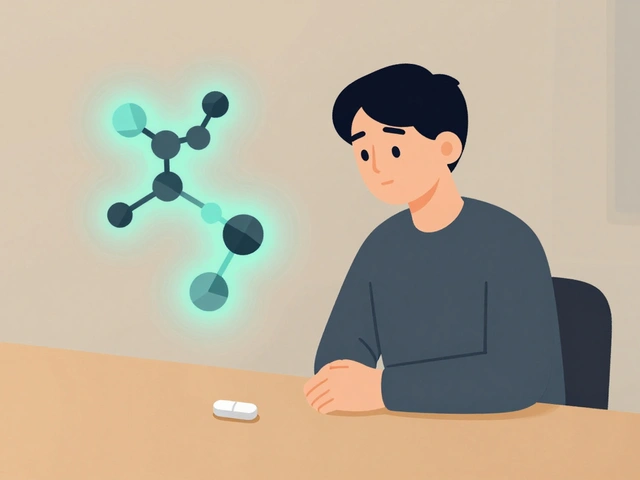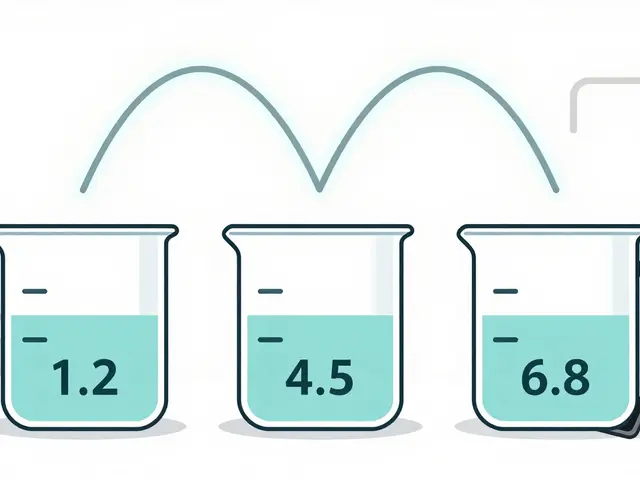Ask anyone who’s ever been haunted by heartburn or kept up by that burning feeling climbing their throat in the middle of the night, and you’ll hear the same name over and over: Protonix. Doctors hand it out for everything from really bad acid reflux that turns eating into Russian roulette, to ulcers that make your insides feel like a rusty cheese grater. Protonix sounds like a superhero drug — but what’s going on behind the scenes? And what should you watch for if you’re popping these yellow tablets every morning?
How Protonix Works: The Real Reason For That “Ahhhh” Feeling
Let’s face it, digging into a greasy burger or stress-eating pizza after a long day can leave a mark — especially if your stomach’s already on high alert. Protonix, also known by its generic name pantoprazole, jumps into action to keep your stomach acid in check. Here’s the magic: it goes after those teeny-tiny pumps in your stomach (proton pumps) that churn out acid. Protonix basically tells them, “Take it down a notch, guys!” and slows the whole process, so you end up with a lot less acid floating around inside you.
If you’re wondering what separates Protonix from all those other acid reducers at the pharmacy, it comes down to power and duration. This isn’t like popping antacids, where the effect comes and goes. This pill is a proton pump inhibitor (PPI), putting the brakes on acid production for the long haul — not just patching things up after the fact. One tablet can keep acid at bay for over 24 hours, which is why so many doctors reach for it when patients’ acid problems are stubborn or severe.
So, who usually ends up on Protonix? If you hear “GERD” (gastroesophageal reflux disease), or you’ve got stomach ulcers or erosive esophagitis, chances are your doctor’s written this name on a prescription pad. People who suddenly start coughing, get a sour taste in their mouth most mornings, or struggle with chest pain right after eating, are all good candidates. Even folks who find their voice getting hoarse (especially in the morning) are sometimes dealing with acid-backed problems that Protonix can calm down.
One of the interesting things about Protonix is that it’s prescribed for both short bursts (like healing up an ulcer or letting irritated tissue recover) and in longer courses for people whose acid just keeps coming back. Gastroenterologists keep a close eye when using it long-term, though. “You always want to use the lowest effective dose for the shortest period possible,” says Dr. Karen Chen, a board-certified GI specialist in New York.
“Long-term use of PPIs is sometimes necessary for chronic conditions, but it’s important to review the need for them with your provider every so often.”
A lot of people, especially if they’re toughing it out with over-the-counter treatments, don’t realize just how much damage untreated stomach acid can do. Think about Barrett’s esophagus — that’s when your acid works overtime and the cells in the esophagus start to morph. This is one of those rare but serious reasons doctors prefer to knock acid way down. Protonix plays a genuine role in reducing the risk of further complications. That peace of mind, for people with a family history of stomach problems, is no small thing.
And, just a quick tip while you’re here: Protonix works best taken before you eat, usually first thing in the morning. It can take a few days (sometimes up to a week) before you feel the full effect, so don’t panic if that burger is still biting back the first day or two. Give it time — it’s sorting out the acid-making machinery deep inside your gut.

Risks, Side Effects, and Things Your Doctor Won’t Always Tell You
Okay, here’s where things get real. Every drug has a downside, and Protonix is no different. Sure, most people get away with maybe a mild headache or a touch of nausea. But let’s get all the cards on the table, because being blindsided by weird side effects never did anybody any favors.
The usual suspects? Some people notice cramps, a little gassiness, or just feeling off in the stomach. Once in a while, diarrhea or constipation sets in. It’s mostly just annoying, but worth mentioning, especially if your system is pretty sensitive to stomach meds anyway. Rarely, someone can get a rash, itchy skin, or joint pain. If you get these, or if your lips, tongue, or throat start to swell (seriously rare, but dangerous when it happens), get help — that’s the kind of allergic reaction doctors take 100% seriously.
If you’re thinking about long-term use, this is where Protonix’s reputation gets a little murky. There’s talk about lowered magnesium, calcium, and vitamin B12 levels if you’re taking it every day for months (or years). That could mean muscle cramps, tingling, or even feeling unusually tired. One thing that’s cropped up in several real-world studies: people on PPIs for a long time are at higher risk for certain infections like C. diff, which causes rough diarrhea, or even pneumonia. Why? Turns out, strong stomach acid is your first line of defense against some pretty nasty bugs. So if you’re dialing that acid down for a long haul, be aware you’re making it easier for bacteria to sneak through.
Breaking a bone is another issue, especially if you’re not exactly 20 anymore. Older adults who take these medications for years have a slightly higher risk of hip, wrist, and spine fractures. That’s because low stomach acid over time can make it harder for the body to absorb minerals like calcium. Am I saying Protonix is dangerous? No way — it’s a safe drug for most people, and docs prescribe it every day for a reason. But if you’re planning to use it more than a few months, it’s worth chatting with your provider about supplements, and maybe even getting your bone density checked if you’re in that age group where bones become more brittle.
On top of that, here’s something nobody likes to talk about: Protonix can play tricks with other medications. Got a prescription for blood thinners, certain antibiotics, or HIV meds? Then bounce this off your pharmacist. Even some over-the-counter heart pills (like clopidogrel, commonly known as Plavix) don’t mix well with PPIs. The last thing anybody wants is to undo the work of another lifesaving drug, so keep your medication list handy, especially before medical appointments.
Let’s cut through the noise: doctors aren’t trying to rob you of your favorite food or make you live in fear of your own stomach. But don’t go DIY on this stuff. Don’t double up on doses because you think it works better (it doesn’t), and don’t just stop cold turkey if you’ve been on Protonix for a while, or you might get a rebound where your acid comes roaring back, even worse than before. Taper down under medical advice. If coming off Protonix, some folks find a few weeks of antacids or H2 blockers (like famotidine) helps take the edge off.

Smart Tips and Real Talk: Getting the Most Out of Protonix
If you’ve made it this far, you’re already ahead of most people. But let’s toss out some pro tips that can make your time on Protonix smoother, more effective, and less stressful.
- protonix isn’t a free pass to ignore trigger foods. Yeah, tacos are delicious, but if you know spicy food sets your system on fire, Protonix helps but won’t erase all the fallout. There’s no harm in adjusting your diet for less pain.
- Consistency is king. Life gets busy, but this med works best when you take it before breakfast, around the same time every day. Making it part of your morning routine — next to brushing your teeth or coffee — can dramatically boost its results.
- Keep a symptom journal. Even people with memory like swiss cheese find a little notebook or a notes app can help track when symptoms flare up. You’d be surprised how often a certain food or stress shows up before an acid spike.
- Plan ahead for travel or busy weeks. Pack your medication in your carry-on or work bag. Missing doses makes for a nightmare road trip — trust me on this one.
- Don’t ghost your doctor. Even if you feel better and want to quit Protonix, have a check-in before you change anything.
- If you’re trying to shave down the dose or come off the medication, do it slowly. One idea: Take Protonix every other day for a week, then every two days, until you’re done. Your stomach won’t throw a wild party the minute you stop, but it might get a little rowdy if you yank away the medicine suddenly.
- Hydrate well. Not complicated, but so many folks on acid reducers slip into lazy habits with water. Extra fluids can actually keep your digestive system running smoother and help with some side effects.
- Watch out for labels on over-the-counter medications. Many cold meds or pain relievers have ingredients that irritate your stomach lining. Ibuprofen is a big offender.
- If you take vitamins, especially B12, magnesium, or calcium, consider having your doctor check your levels now and then. Some folks need a little boost or a change in supplement routine.
Real talk: you might run into well-meaning family and friends who say “just drink more milk” or start suggesting every grandma’s stomach remedy. Smile and nod, but trust your own gut (pun intended) and your healthcare team. Acid problems can take over your life, making work, sleep, and eating with friends a mess. But Protonix lets a lot of people get back to normal, with fewer surprises and less pain at the dinner table. Out of all the acid-fighting drugs out there, this one’s earned its spot in the medicine cabinet — just be smart about how and why you use it, and have honest check-ins with your doctor from time to time.







Herman Rochelle
July 18, 2025 AT 16:15I really appreciate posts like this that take the mystery out of medications. Protonix, being a proton pump inhibitor, is something many people use without really knowing how it works or what precautions to take. It's not just about reducing acid but also about protecting your stomach lining and esophagus over the long haul.
One tip I always hear from doctors and patients alike is to take it before meals to maximize its effectiveness. Also, knowing the side effects like headaches, nausea, or in rare cases, serious infections can help users be proactive in monitoring their health.
Has anyone here experienced any unexpected side effects or maybe found helpful ways to manage them? I think sharing real-world experience is valuable beyond what’s in the official drug guides.
Stanley Platt
July 22, 2025 AT 06:33Indeed, to begin with, Protonix, which functions through the inhibition of H+/K+ ATPase enzyme, serves effectively to curtail gastric acid secretion. It is paramount for patients to be thoroughly informed about the pharmacodynamics and potential adverse reactions associated with its administration. Adherence to prescribed dosage and timing is crucial.
Furthermore, drug interactions present a significant concern; for instance, Protonix may alter the absorption of certain antifungals and HIV protease inhibitors. A cautious approach should be adopted in polypharmacy cases.
In addition, long-term use has been linked to potential nutrient malabsorption such as that of magnesium or vitamin B12, which necessitates monitoring.
One must ask, are physicians adequately communicating these facets during consultation? Are pharmacovigilance protocols sufficiently vigilant?
Alice Settineri
July 25, 2025 AT 20:52Oh my gosh, when I started Protonix, it felt like my stomach finally caught a break after months of fiery agony! The way this little pill seems to tame the beast of acid reflux is just stellar. But hey, it’s not all sunshine and rainbows — I got hit with this annoying headache for a few days, and that bugged me for sure.
One juicy tidbit: drink plenty of water when you pop it, and steer clear of alcohol, because your tummy’s on a delicate rollercoaster ride. Oh, and diet changes! That’s a whole saga on its own — cut down on spicy and greasy stuff, or your Protonix might just throw in the towel.
Anyone else notice extra energy or weird dreams after taking it? I swear, my sleep got a little trippy at times.
nathaniel stewart
July 29, 2025 AT 11:10Protonix has undoubtedly changed the quality of life for many dealing with chronic acid-related issues, and it’s essential to underscore the importance of following the prescribed regimen meticulously. Even minor deviations can alter the drug’s efficacy and increase the likelihood of side effects.
Please, if anyone contemplates discontinuing Protonix abruptly, take heed — rebound acid hypersecretion is a documented phenomenon that can exacerbate symptoms.
Moreover, being vigilant about symptoms that could indicate serious complications, such as severe diarrhea or allergic reactions, is paramount.
Has anyone consulted with their healthcare provider on strategies for tapering off Protonix safely?
Pathan Jahidkhan
August 2, 2025 AT 01:28Does this Protonix truly quiet the roaring tempest within the gut or simply mask the flames for a fleeting moment? In a world filled with chemical concoctions promising relief, what is the cost of such respite long term? The paradox lies in a pill that reduces acid, yet acid is necessary — the primal essence for digestion.
Questions mount like shadows: Does suppressing nature’s own fire disrupt the balance, invite new dilemmas? The lazy complacency endorsed by routine prescriptions may overlook the philosophical discourse on bodily harmony.
Yet, if peace can be purchased with a dose, who dares to refuse? Still, it behooves us to question the ramifications beyond the surface.
Dustin Hardage
August 5, 2025 AT 15:47Protonix's mechanism of action as a proton pump inhibitor places it among the more nuanced therapies in acid-related disorders. It is indispensable that prescribers weigh the risk-benefit ratio carefully, especially in patients requiring prolonged therapy, due to the well-documented risks of hypomagnesemia, osteoporosis, and susceptibility to enteric infections.
Moreover, patients must be counseled on potential drug-drug interactions, including with clopidogrel, monitoring for therapeutic efficacy and adverse events.
Considering the pharmacokinetic profile of pantoprazole, timing relative to meals and other medications could critically influence outcomes. So, precision in administration is not mere pedantry but clinically salient.
Alice Settineri
August 9, 2025 AT 06:05@Herman Rochelle, totally with you on those real-world tips. My doc told me to take it before breakfast, which definitely made a difference. Also, water, water, water! And yeah, those side effects caught me off guard a bit.
Funny thing is, the dreams! I swear, my brain cooked up the craziest scenarios during those nights. Anyone else? It was like a side effect theater.
Would love to hear more people’s stories about usage — it makes the whole experience less lonely, ya know?
Leslie Woods
August 12, 2025 AT 20:23I wonder about the long-term dependence aspects of Protonix. Like it seems great for immediate relief, but does the body get lazy when you suppress acid this way? Are there known protocols for safely reducing dosage over time without the dreaded rebound acid feeling?
I also wonder how people balance Protonix with natural remedies. Has anyone tried combining lifestyle changes plus the medication, like diet shifts or stress management? Curious if it really makes a lasting difference.
Jim McDermott
August 16, 2025 AT 10:42Great question about natural remedies versus pharmaceutical intervention. From what I gather, managing GERD or acid reflux with Protonix does not exclude lifestyle tweaks but rather complements them. Things like avoiding large meals before bed, elevating the head during sleep, and reducing caffeine intake can all enhance treatment outcomes.
Also, for those worried about side effects, staying hydrated and reporting any unusual symptoms early to your healthcare provider can help mitigate risks.
Does anyone experience fluctuations in symptom relief depending on their daily habits along with the medication?
Naomi Ho
August 17, 2025 AT 16:13Just chiming in from a clinical perspective — patients often overlook the importance of ongoing follow-up when on Protonix. Monitoring magnesium levels and bone density can’t be overstated, especially for those under long-term therapy.
Additionally, patients should be counseled not to discontinue the medication abruptly without consulting their doctor due to possible rebound symptoms.
Education and clear communication at prescription time are key to safe use.